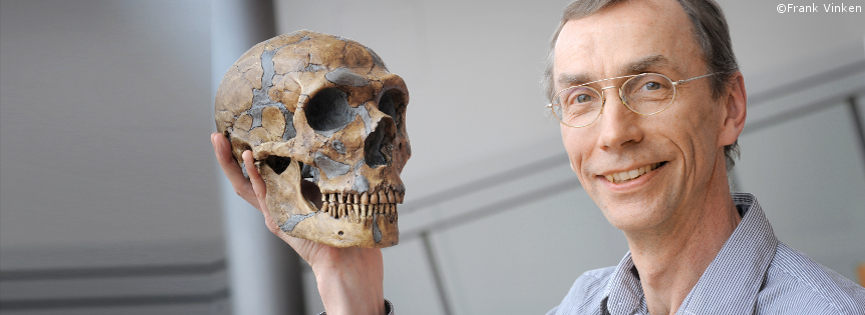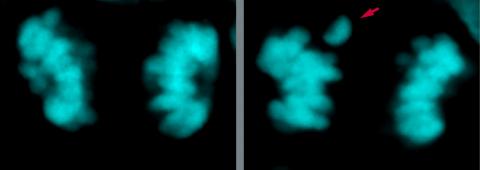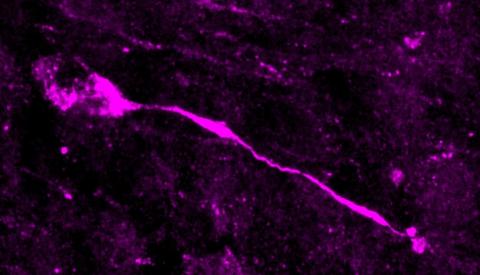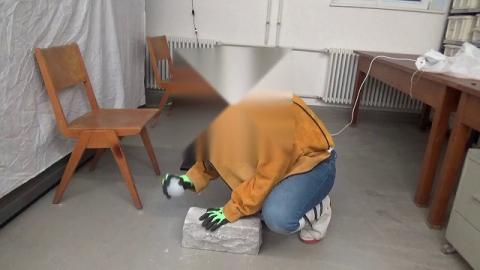Reactions: Nobel Prize in Medicine or Physiology for Svante Pääbo, father of palaeogenetics
The Karolinska Institute has awarded the Nobel Prize in Medicine or Physiology to Swedish biologist Svante Pääbo, a specialist in evolutionary genetics, for his discoveries on the genomes of extinct hominids and human evolution.

Svante Pääbo. / © Frank Vinken
Antonio Rosas - Nobel Svante Pääbo EN
Antonio Rosas
Research professor in the Department of Paleobiology at the National Museum of Natural Sciences, CSIC
Svante Pääbo's contribution to knowledge is extraordinary. In addition to devising the advances in palaeogenetics that have opened up a wealth of new research, Svante Pääbo was able to integrate the classical disciplines of palaeontology and archaeology with the development of cutting-edge research techniques into a new scientific paradigm.
María Martinón - Nobel Svante Pääbo EN
María Martinón-Torres
Directora del Centro Nacional de Investigación sobre la Evolución Humana
Svante Pääbo's work, in addition to having been a methodological revolution, has provided unknown data on our interaction with other human species in the past, promoting a critical and necessary reflection on how we humans relate to each other today. It is research literally at the frontier of knowledge, as it has allowed us to apply knowledge, such as genetics, and concepts, such as hybridisation, which were not common in the field of palaeontology. In our field, his contribution has meant a paradigm shift, promoting molecular research into the past, a line that continues to advance and gain prominence. The analysis of ancient DNA, for which he laid the foundations, has now given way to the emerging field of palaeoproteomics, or the study of ancient proteins, which will promote another before and after, similar to that of palaeogenetics.
I am delighted that the Nobel Prize has been awarded in a field of research, the study of the past, in which our country is a world leader; and I hope that this will translate into even greater attention and support for the research being done in this field in our country. This emphasises the importance of studying our origins and overturns the distinction between applied sciences and basic sciences, and the fact that the latter have less weight in the advancement of knowledge.
She is a member of the advisory committee of SMC Spain.
Carles Lalueza - Nobel Medicina EN
Carles Lalueza-Fox
Director del Museo de Ciencias Naturales de Barcelona y especialista en técnicas de recuperación de ADN en restos del pasado
Svante Pääbo ha sido el líder del campo de la paleogenómica desde su inicio, su investigación en la década de los 90 del siglo pasado culminó con la primera recuperación de ADN mitocondrial de un neandertal, en el que constituyó un hito científico que representó además la consolidación del campo científico. Después, lideró el proyecto Genoma Neandertal, que culminó en el año 2010 con la recuperación del primer genoma de un hominino del pasado. Hay que tener en cuenta que, cuando inició dicho proyecto, ni siquiera existían las tecnologías de secuenciación masiva que permitieron después llevarlo a cabo; esto da una idea de su capacidad de visión.
Desde el año 2005 colaboramos estrechamente con el análisis de restos neandertales del yacimiento asturiano de El Sidrón, colaboración que ha generado un número considerable de publicaciones científicas de alto impacto, como la recuperación de un gen implicado en el lenguaje, la primera recuperación de ADN neandertal del sedimento de una cueva o la primera recuperación del cromosoma paterno neandertal, y que ha llevado también a consolidar esta línea de investigación en nuestro país.
Conflicto de interés: ha investigado junto a Svante Pääbo.
Víctor Borrell - Nobel Medicina EN
Víctor Borrell
Research Professor at CSIC at the Institute of Neurosciences (Alicante)
I think this is fantastic news. Svante has been at the forefront of research for many years and, in fact, has opened up the field of palaeogenomics, which involves the genomes of extinct species. He was the pioneer early in his career in developing technologies to enable such sequences. He has enabled others to follow in his footsteps and not only his laboratory, but many others, have been able to reveal the genome sequence of species that no longer exist. Today we are already talking about many different species, from extinct ancient humans to dogs, horses and so on.
Obviously, the most important thing is that with the sequencing of the genomes of extinct human species we have learned to confirm the origin of human beings in Africa and to determine the main migration routes from Africa to the rest of the planet; but also to understand more specific aspects of how the brain develops, what differences there may have been between the brains of different species, what advantages modern humans may have had over Neanderthals... And also aspects such as the interbreeding that took place between the different species of human beings when there were Neanderthals, Denisovans and modern humans, who coexisted at the same time and in the same place and mated with each other. Without Svante's work and contributions we cannot imagine our understanding of human evolution.
José María Bermúdez de Castro - Nobel Medicina
José María Bermúdez de Castro
Research Professor at CSIC and Coordinator of the Paleobiology Programme at the National Centre for Research on Human Evolution (CENIEH), Burgos
It was a most pleasant surprise to learn that our colleague Svante Pääbo has been awarded the Nobel Prize in Medicine or Physiology. It is the first time that someone so closely connected with the evolution of mankind has received an award for excellence. We are delighted to celebrate this prize because it recognises the work of a scientific field that is essential for understanding our past and, above all, for reflecting on our future.
Juan Luis Arsuaga - Nobel Medicina EN
Juan Luis Arsuaga
Palaeontologist and scientific director of the Museum of Human Evolution in Burgos
I am impressed because I have never collaborated with a Nobel Prize winner before! With Pääbo I have many publications. We have done many things together. On a personal level, it is fantastic because I am honoured to have collaborated and to continue to collaborate with Svante Pääbo, whom I consider a friend: he is my first Nobel Prize friend. I enthusiastically supported his candidacy for the Princess of Asturias Prize and I feel very close to him. I have just found out about it now, as I am leaving school. I think it is very well deserved and I am particularly touched.
Svante Pääboo is the creator of a new scientific discipline. That makes him really exceptional because he is not just a researcher but he is the creator of a new branch of science and that is going beyond. He is also a Nobel laureate in the science of human evolution.
Conflict of interest: has researched and is researching together with Svante Pääbo.
Ana B. Marín Arroyo - Nobel Medicina EN
Ana B. Marín Arroyo
Full Professor of Prehistory and Director of the EvoAdapta Group at the University of Cantabria
Svante Pääbo's revolutionary discovery by sequencing the genome of extinct hominids, such as the Neanderthals, was a key milestone in prehistoric studies. Sequencing the complete Neanderthal genome allowed us to learn, among many other invaluable aspects of the fossil record, that we ourselves carry between 2 and 4% of Neanderthal DNA as a result of having interbred with them. Pääbo has opened up a new line of research that is providing key data for understanding our own human evolution - a well-deserved prize!
Gema Chacón - Nobel de Medicina EN
M. Gema Chacón
Researcher at IPHES-CERCA in Tarragona, associate professor at the Universitat Rovira i Virgili and associate researcher at the Muséum National d 'Histoire Naturelle (Paris, France)
Svante Pääbo's work has been a major revolution, bringing together disciplines from the study of the past with those of genomics, as well as providing information that has allowed us to broaden our knowledge of past species and their interaction.
Palaeogenomics, the new scientific discipline he has created, and his contributions are giving us an understanding of human evolution that until a few years ago we thought unthinkable.
This well-deserved Nobel Prize goes to medicine, but also to archaeology, palaeontology and other disciplines in the study of human evolution.
Jesús Jordá - Nobel Medicina EN
Jesús F. Jordá Pardo
Professor of Prehistory at the Department of Prehistory and Archaeology and Vice-Dean of Research and Internationalisation
Svante Pääbo is a pioneer in the study of the palaeogenetics of human populations and his achievements are very relevant in relation to the palaeogenetics of Neanderthals. In this sense, his genomic studies on the thirteen individuals recovered in the El Sidrón cave (Infiesto, Asturias), the largest accumulation of Neanderthal remains in a site, which have allowed us to know in detail the characteristics of this Asturian population.
Eudald Carbonell - Nobel Medicina EN
Eudald Carbonell
Co-director of the Atapuerca Project and Director General of the Atapuerca Foundation
The contribution to science of Swante, the newly awarded Nobel Prize in Medicine 2022, is from all points of view essential and relevant. Palaeogenomics applied to human origin and evolution has allowed us to better understand ourselves as a genus and species. He and his team have pioneered the discovery of the oldest mitochondrial and nuclear DNA of humans in Atapuerca. His scientific contribution to the discovery of a new species, Homo denisoviensis, and to the knowledge of the genome of Homo neanderthlensis has allowed us to know the generic and specific proximity between them and our species Homo sapiens.



